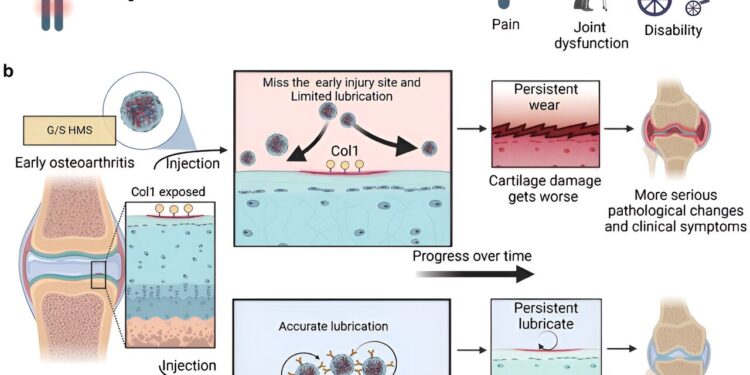Antibody-mediated targeted lubricating hydrogel microspheres. Credit: CAS
A team of materials engineers and orthopedic specialists affiliated with several institutions in China has developed a hydrogel to slow or stop the progression of osteoarthritis. Their research is published in the journal Advanced materials.
Osteoarthritis is a degenerative joint disease. It occurs when cartilage and cushion-like tissue in the spaces where joints meet breaks down. This results in reduced lubrication and increased friction, preventing easy movement of the joint and often causing pain. It is caused by multiple factors, such as an autoimmune response or poor exercise habits. The WHO has declared the disease a global health crisis, affecting more than 528 million people in 2019.
Previous research has led to the development of therapies such as saline or corticosteroid injections, but neither method completely reduces friction or pain, and the injections must be repeated every few months. In this new initiative, the Chinese team has developed a hydrogel that, once injected, is far more effective than other treatments, the researchers say.
The researchers made the hydrogel by mixing hollow spheres with polymer to create a slippery substance. The spheres are a mixture of gelatin methacrylate and poly(sulfobetaine) methacrylate. Then, to make the hydrogel stay in the joint where it is injected, they added a targeted antibody, which binds to both the microspheres and the damaged cartilage.
To test their hydrogel, the research team induced osteoarthritis in rats. They then injected the rats with their hydrogel and had them do physical exercises to measure the impact of the hydrogel on their ability to move normally.
The researchers found that injecting the hydrogel led to increased lubrication, which coincided with reduced friction and fewer symptoms in the rats. They also found that, while present in the rats’ joints, the hydrogel prevented further joint damage.
The team also found that the hydrogel outperformed traditional therapies, suggesting it offers a promising approach for treating early-stage osteoarthritis.
More information:
Xiangming He et al., Precise lubrication and protection of cartilage damage by targeting hydrogel microspheres, Advanced materials (2024). DOI: 10.1002/adma.202405943
© 2024 Science X Network
Quote: Hydrogel developed to slow or stop early stages of osteoarthritis (2024, September 3) retrieved September 3, 2024 from
This document is subject to copyright. Apart from any fair dealing for the purpose of private study or research, no part may be reproduced without written permission. The content is provided for informational purposes only.



